EWOSA News - December 2020

- Home
- EWOSA News - December 2020
Welcome to the latest edition of the Energy and Water Ombudsman SA (EWOSA) quarterly newsletter: your one stop shop for emerging consumer trends, hot issues and policy matters.
From the Ombudsman
Our media release highlighted some of the key facts from our 2019-20 Annual Report. Other areas of interest in our 2019-20 Annual Report include:
- EWOSA customer satisfaction was 96%
- of 23 sub-issues in 2019-20, 18 had fewer cases compared with the previous year
- Financial Hardship increased by 15% and Disputed Liability more than doubled. These are notable in comparison to a decrease for the majority of other sub-issues
- solar meter case levels have remained steady throughout the year, in contrast to the trend of decreases for the majority of other sub-issue cases. Complaints about solar meter upgrade delays were still higher in June 2020 compared to June 2017 before metering competition was introduced.
As noted in our Annual Report, we have been pleased to see the way in which sub-issues like Hardship and Disputed Liability reduced very significantly in the latter part of the year. From April to June, cases related to Hardship and Disputed Liability became very infrequent, and in general credit management issues decreased significantly. We continue to work with regulatory bodies and our Members to report any Hardship and Disputed Liability cases of concern, as well as address the trends we observe in metering.
The South Australian Government has recently introduced five new arrangements which aim to support an orderly transition to renewables. Released under the “Smarter Homes” banner, our Customer Corner section in this newsletter provides further information about these changes. Our Scheme is here to support customers’ navigation of possible complaints associated with reforms like these and provide assistance through the transitional period and beyond. Please contact us on 1800 665 565 or via our website if you need help.
Sandy Canale
Energy and Water Ombudsman SA
Consumer Trends 1
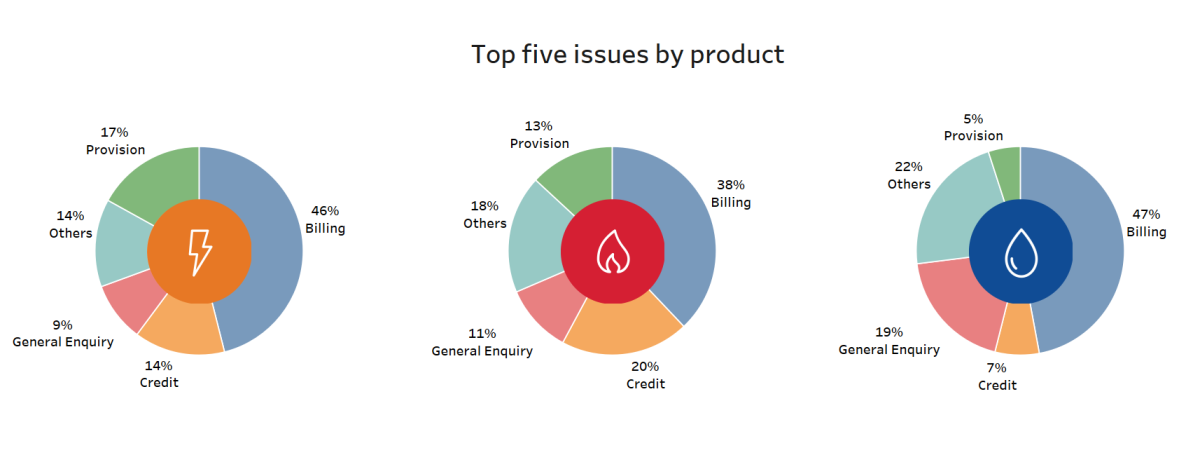

Hot Topics
The South Australian Government is seeking to introduce a new energy efficiency scheme
To be known as the Retailer Energy Productivity Scheme (REPS), the REPS is targeted at households, businesses and the broader energy system, with a focus on low-income households. As well as supporting energy efficiency activities in homes and businesses, the REPS also will support energy demand management and demand response activities e.g. connecting a new or existing battery to an Approved Virtual Power Plant.
The Government is undertaking a consultation phase on the REPS. As part of the consultation, they are considering how to incentivise deeper retrofits in priority group households, including combinations of major appliance replacement, and building-shell upgrades. This could include installation of insulation, installing an efficient new heating/cooling system or purchasing a new high-efficiency fridge.
More information:
A caller claiming to be an Australian Energy Regulator employee who is requesting bank details is part of a scam
A caller claiming to be an Australian Energy Regulator (AER) employee has been requesting bank details to deposit a Government rebate for power due to the current COVID situation. Receiving these reports, the AER has responded and said it would never ask for a customer’s bank details.
The AER has said anyone who receives such a call should never provide personal or financial information and hang up immediately. The scam has been reported to the ACCC.
Source:
The Essential Services Commission of South Australia is reviewing how it regulates small-scale suppliers
The following activities are collectively referred to as small-scale networks:
- water and/or sewerage networks with 50,000 connections or less
- off-grid electricity, and
- reticulated liquid petroleum gas (LPG) networks.
The Essential Services Commission of South Australia (the Commission) licenses 79 small-scale network service providers. These providers include councils, private service providers and community associations. In total, the networks provide services to around 107,000 customers.
In its Draft Inquiry Report, the Commission is seeking to introduce a new regulatory framework for small-scale services which will:
- introduce a trust and accountability regulatory model
- harmonise industry codes and guidelines, and
- mandate Energy and Water Ombudsman SA membership.
Source:
Falling wholesale prices in April to June 2020 could be an emerging trend
In mid-August 2020, the Australian Energy Regulator (AER) reported that falling wholesale prices in both electricity and gas could flow through to customers and retail prices should fall further over the coming year. This is because wholesale prices make up about a third of an average residential bill.
AER Chair Clare Savage, said: “It can take time for gas and electricity wholesale price drops to flow through to household bills because many retailers have bought a lot of their wholesale energy a year or two in advance when wholesale prices were higher than they are now. These wholesale price reductions have begun to flow through to customers though and retail prices should fall further over the coming year.”
Falling electricity wholesale prices were caused by lower fuel costs for generators and increased use of renewables. Falling wholesale prices for gas were caused by more competition, global price drops and cheaper transportation.
Source:
The Australian Energy Market Commission has decided to allow some retailers to defer payment of network charges
The Australian Energy Regulator (AER) proposed to the Australian Energy Market Commission (AEMC) that retailers be able to defer payment of network charges, given the impact of COVID-19 and the additional support retailers have had to provide to customers in need.
On August 6, 2020, the AEMC accepted the rule-change proposal and provided for some retailers to defer payment of network charges for a period of six months. AER Chair Clare Savage said: “Energy retailers have an ongoing responsibility to support customers who have been affected by the pandemic. That extra customer support, such as payment plans and deferrals, comes with risks and costs that can affect a retailers’ cash flow. Allowing some retailers to defer their payment of network charges for six months will provide a buffer for retailers.”
Source:
Consumer Trends 2
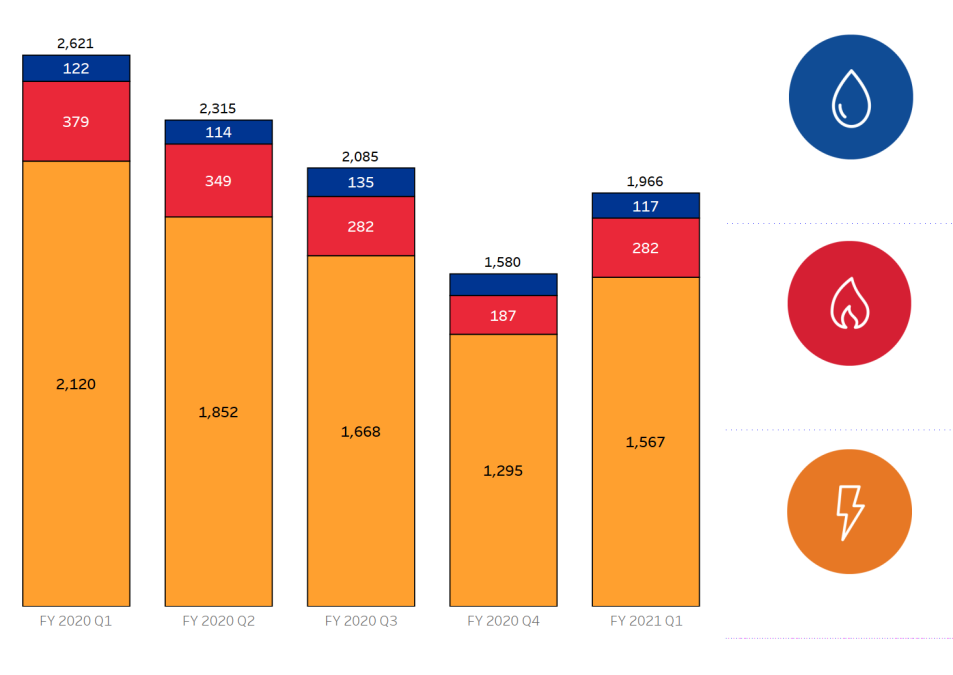

Case studies
Issues: Credit Management – Disputed Liability – Credit Action Taken in Error – Default Listed in Error
Utility: Electricity
Customer Type: Residential
Case Type: Investigation
The Issue:
Ms W complained about a default listing on her credit file for a finalised account at a previous address. She complained that her supplier charged for electricity use after she vacated the property and so disputed the charges and the subsequent default listing.
Our Review:
We found that the supplier issued the bills based on the actual meter reads recorded on the meter. However, Ms W’s supplier agreed to backdate the final bill based on the date Ms W commenced a lease at another property. We verified that Ms W’s supplier then cancelled the disputed final bill and issued an amended final bill to the date Ms W vacated the property, which reduced the final account balance.
Resolution:
The supplier offered to remove the default listing and apply a $647 credit to the closed account for the unapplied pay-on-time discounts as a gesture of goodwill. As the supplier had already sold the debt, Ms W was directed to the debt buyer to discuss payment options for the reduced debt.
Issues: Billing – High – Unexplained Usage
Utility: Water
Customer Type: Residential
Case Type: Investigation
The Issue:
Ms T had higher-than-expected water bills over several years caused by an unknown leak in her private pipework. She complained that she queried her high water use with her supplier on many occasions but received minimal assistance. Her supplier recently completed a pressure test at Ms T’s property, which identified the leak in her private pipework. Ms T repaired the leak but complained her supplier should have completed a pressure test earlier, which would have identified the leak and prevented further wasted water and high bills.
Our Review:
We reviewed Ms T’s interactions with her supplier and found her supplier adequately explained the methods that she could use to check if there was a leak at the property and also suggested she contact a plumber. However, we also found that her supplier could have arranged a pressure test earlier.
Resolution:
Ms T’s supplier offered a $200 goodwill credit for the delay in arranging a pressure test. Ms T’s supplier also offered a $680 leakage allowance as a gesture of goodwill, which was more than would normally be applied under its leakage allowance policy.
Consumer Trends 3
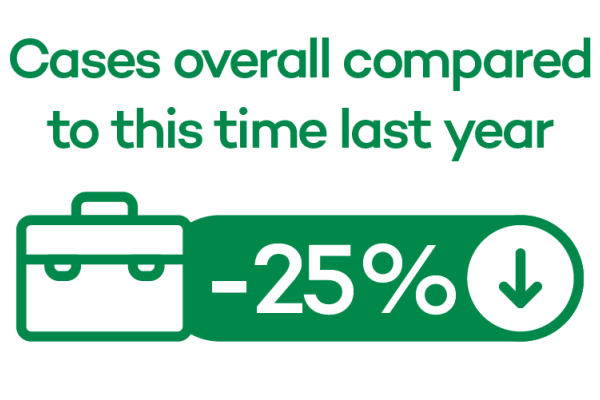
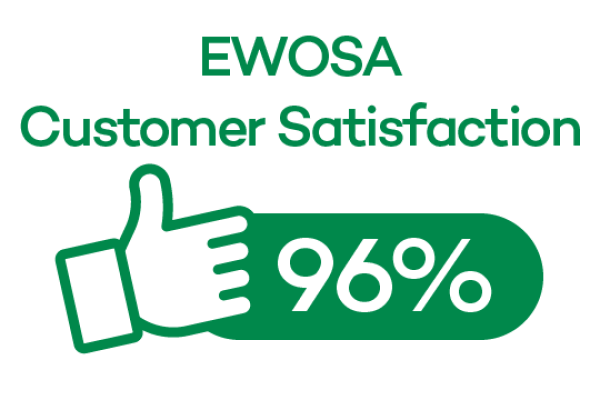
Customer Corner
The Helping You Stay on Track campaign aims to alert customers to available support
Worried about your energy bill? Your retailer can help.
Are you, or someone you know, worried about your next energy bill because your financial or employment situation has changed due to COVID-19? Your energy retailer can help you stay on track.
Electricity and gas retailers offer a broad range of assistance and can work together with customers to set up an individualised support plan.
There is support available even if you have not missed a bill. Retailers provide practical advice on how to reduce your energy consumption and lower your bills and can advise on discounts and government support.
Energy retailers understand that this is a difficult time, so if your circumstances have changed and you are worried about your next electricity or gas bill, talk to your retailer today so they can understand your situation. Your retailer’s contact number is located at the top of your energy bill.
Learn more at the Australian Energy Council website www.energycouncil.com.au/coron... where you can also access information in different languages.
Source:
The South Australian Government has introduced a Smarter Homes initiative
The Smarter Homes initiative aims to increase the amount of rooftop solar generation in the future as well as keep the system secure and stable. To do so, they have introduced new technical standards and requirements. The new conditions apply to solar systems, including inverters and smart meters, as well as to retailers to ensure they offer retail plans which encourage shifting of electricity demand.
The changes being proposed are moderately complex as they do not apply in all situations. Customers are encouraged to read the following information:
Information for customers and owners
Fact sheet for solar owners and consumers
Our Scheme is here to support customers to navigate possible complaints associated with reforms like these and provide assistance through the transitional period and beyond. Please contact us on 1800 665 565 or via our website if you need help.
Source:
Our Scheme has grown significantly since its early days. The Scheme was set up by the Founding Members, ETSA Power (now AGL South Australia), ETSA Utilities (now SA Power Networks) and ElectraNet. Established in October 1999 as the Electricity Industry Ombudsman (SA) Limited, it was created to be the independent dispute resolution scheme. The Electricity Act 1996 required the electricity industry to be members of an ‘approved scheme’, and the South Australian Independent Industry Regulator, now Essential Services Commission (of South Australia) (”the Commission”), approved the Company as such a scheme.
The Company name was changed to Energy and Water Ombudsman (SA) Limited in December 2011 in anticipation of the Water Industry Act 2012 amendment and SA Water having voluntarily joined the Scheme. In July 2013, the Commission further approved the Scheme under the Water Industry Act 2012 as the approved ombudsman scheme for the purposes of that Act.
Public Submissions
Consumer Trends 4
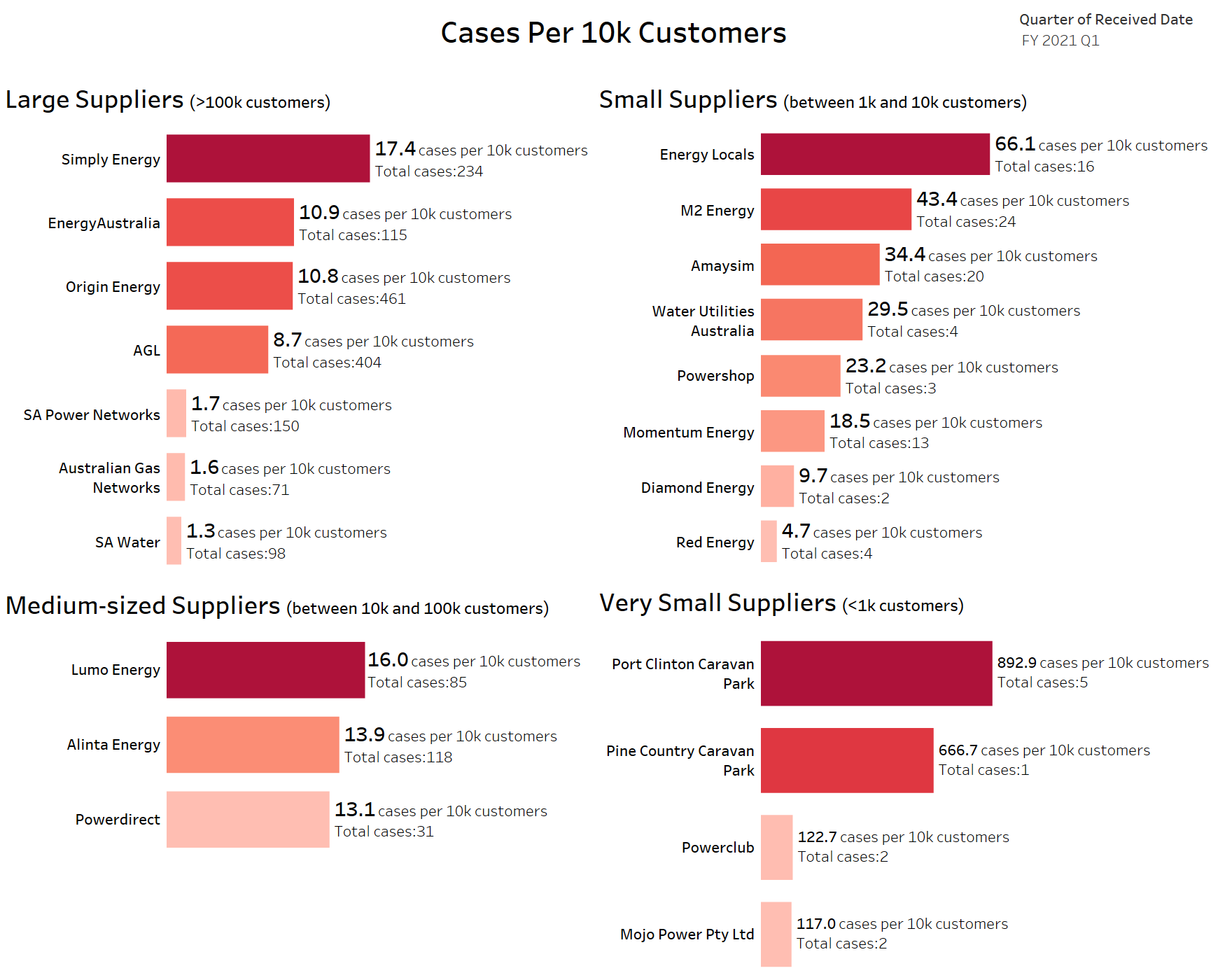
The number of cases per 10,000 customers for each supplier is calculated by dividing the number of cases received during the quarter by the total number of customers for each supplier, multiplied by 10,000. Large Suppliers are those with over 100,000 customers, Medium-sized Suppliers have between 10,000 and 100,000 customers, Small Suppliers have between 1,000 and 10,000 customers and Very Small Suppliers have less than 1,000 customers. The total number of cases is also presented for context.
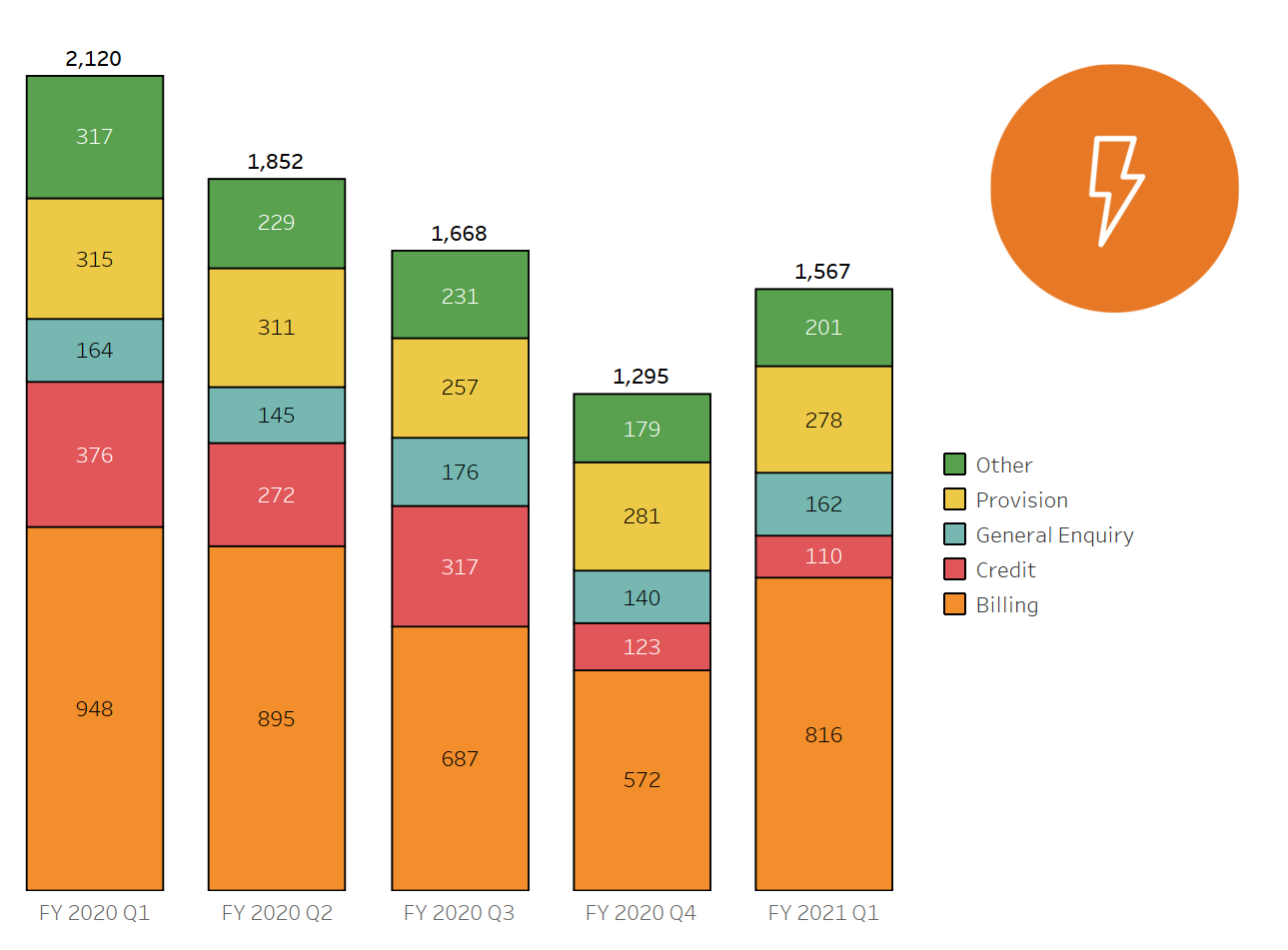
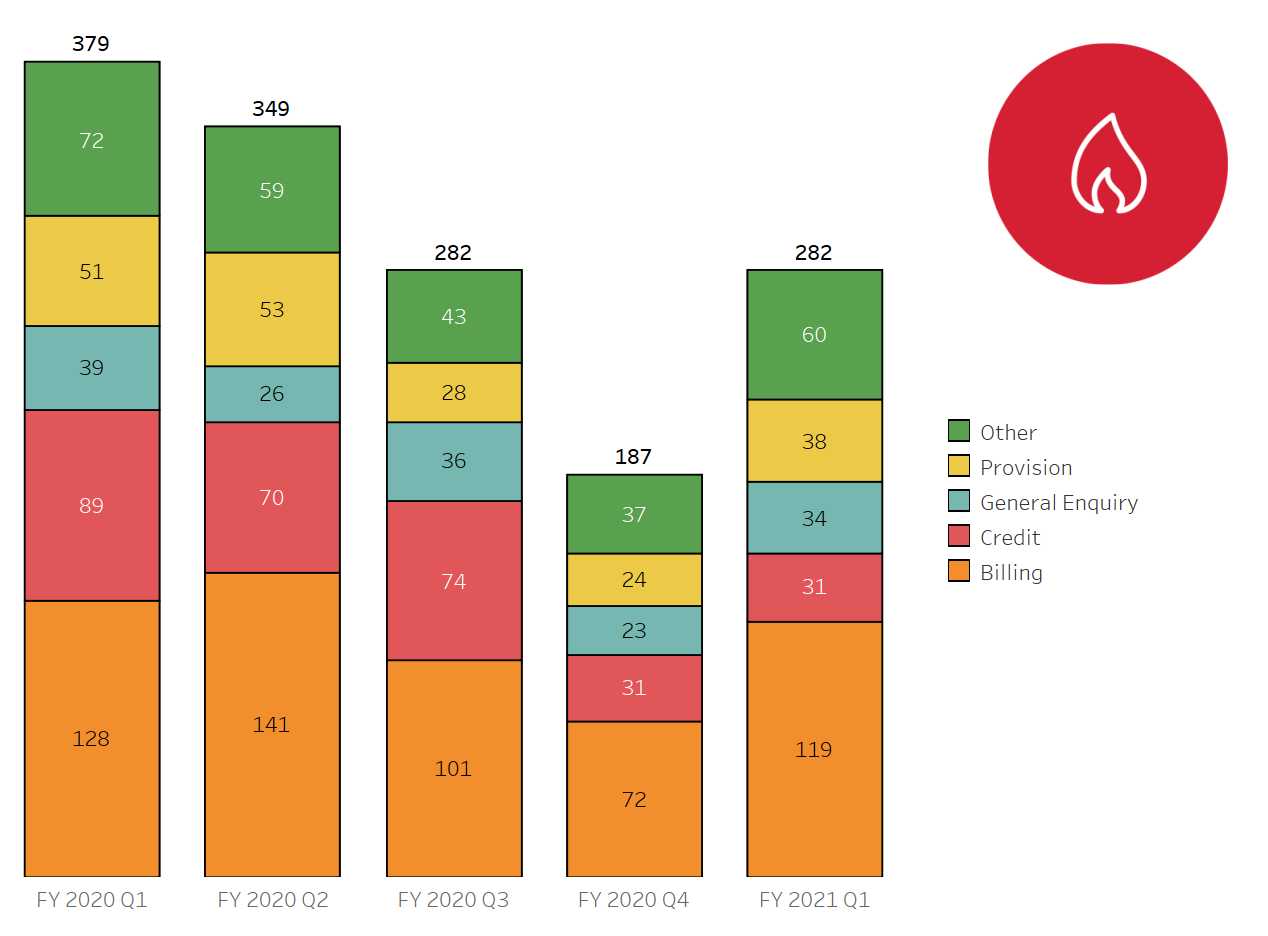
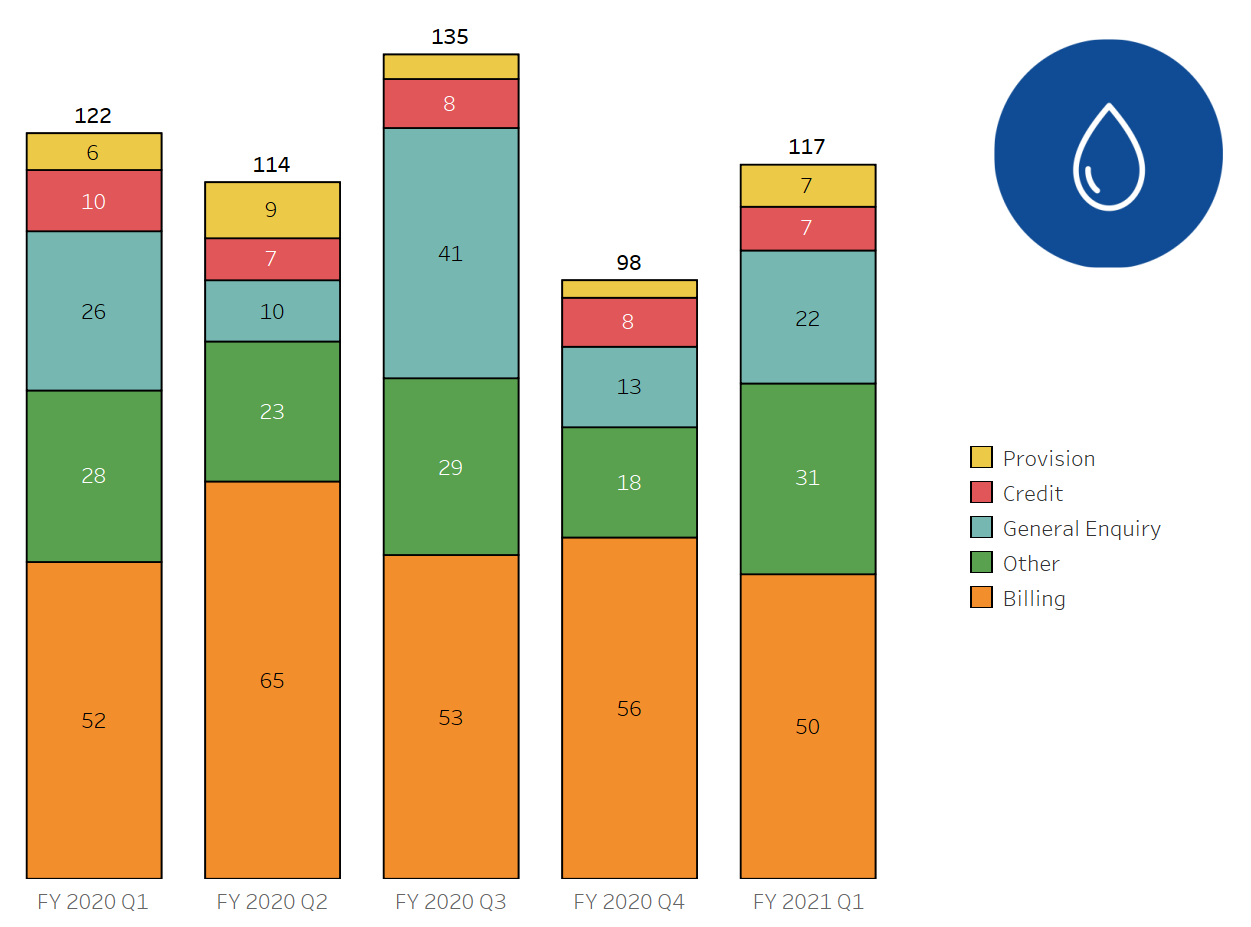
Remember, we are here to help
EWOSA facilitates the prompt resolution of complaints and disputes between consumers of electricity, gas and water services and Members of the Scheme by providing a service to consumers which is free, independent, accessible, fair and informal.
Freecall 1800 665 565
SMS 0488 854 555